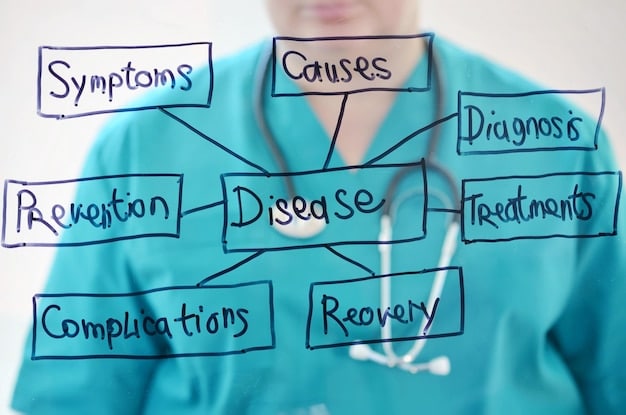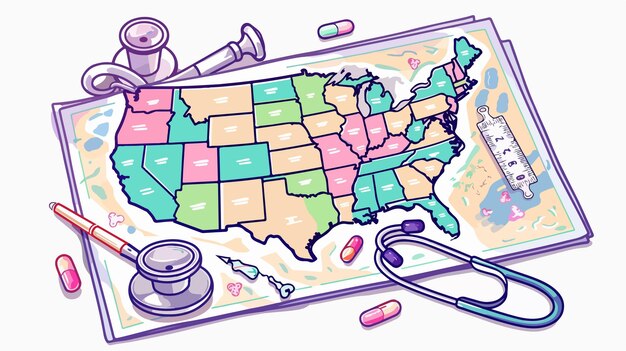Medicare Expansion & Mental Health: Access in 2025

The expansion of mental health services under Medicare in 2025 aims to improve access to care by increasing coverage, reducing costs, and integrating mental healthcare with primary care, though challenges remain in addressing workforce shortages and ensuring equitable access across all populations.
The landscape of mental healthcare in the United States is on the cusp of significant change, particularly for Medicare beneficiaries. The year 2025 is set to bring substantial expansions in mental health services covered under Medicare, prompting a crucial question: How Will the Expansion of Mental Health Services Under Medicare Affect Access to Care in 2025?
Understanding Medicare’s Current Mental Health Coverage
Before diving into the specifics of the planned expansion, it’s important to understand the current state of mental health coverage under Medicare. While Medicare has historically covered some mental health services, there have been limitations in scope and reimbursement that have created barriers to access for many beneficiaries.
Current Coverage Details
Traditional Medicare (Parts A and B) covers a range of mental health services. Part A covers inpatient mental health care received in a psychiatric hospital or general hospital. Part B covers outpatient mental health services, including therapy, psychiatric evaluations, and medication management.
- Inpatient Care: Coverage for mental health care received in a psychiatric hospital is subject to a lifetime limit of 190 days.
- Outpatient Therapy: Medicare Part B typically covers 80% of the allowed amount for outpatient mental health services, after the annual deductible is met.
- Medication Management: Medicare also covers prescription drugs for mental health conditions through Part D, but this requires enrollment in a separate prescription drug plan.
Despite this coverage, many Medicare beneficiaries still face challenges in accessing mental health care. High out-of-pocket costs, stigma surrounding mental illness, and a shortage of mental health providers who accept Medicare are significant barriers.

Ultimately, understanding where Medicare currently stands is key to grasping the potential impact of the upcoming expansion. Recognizing existing gaps helps to underscore why these changes are necessary and how they might reshape the mental healthcare landscape for seniors.
Key Changes Coming in 2025
The planned expansion of mental health services under Medicare in 2025 represents a significant step forward in addressing the mental health needs of older Americans. These changes aim to broaden coverage, reduce cost burdens, and improve the integration of mental healthcare with primary care.
Expanded Coverage for Telehealth
One of the most notable changes is the expansion of coverage for telehealth services. The COVID-19 pandemic highlighted the potential of telehealth to improve access to care, particularly for individuals in rural areas or those with mobility limitations. The 2025 expansion seeks to make these changes permanent.
- Elimination of Geographic Restrictions: Medicare will permanently eliminate geographic restrictions for telehealth services, allowing beneficiaries to access care from any location.
- Expanded Provider Types: The expansion will also include a broader range of providers who can offer telehealth services, such as licensed professional counselors and marriage and family therapists.
- Audio-Only Telehealth: In certain circumstances, Medicare will also cover audio-only telehealth services, recognizing that not all beneficiaries have access to reliable internet or video technology.
By embracing telehealth, Medicare aims to overcome geographical barriers and increase access to mental health services for those who need it most. This is a crucial step in ensuring that all beneficiaries, regardless of their location or circumstances, can receive timely and effective care.
These expanded coverage options are designed not only to improve immediate access but also pave the way for more sustainable and integrated mental healthcare solutions in the long term.
Potential Impact on Access to Care
The changes coming in 2025 have the potential to significantly improve access to mental health care for Medicare beneficiaries. By expanding coverage, reducing costs, and promoting integration, these reforms could help to address several key barriers that currently limit access.

Reduced Financial Barriers
One of the most significant ways the expansion can impact access is by reducing financial barriers. Lowering the costs associated with mental health services makes them more affordable and accessible for beneficiaries with limited incomes.
- Lower Co-pays and Deductibles: The expansion includes provisions to lower co-pays and deductibles for certain mental health services, reducing the out-of-pocket costs for beneficiaries.
- Increased Reimbursement Rates: By increasing reimbursement rates for mental health providers, Medicare may be able to attract more providers to participate in the program, increasing the availability of services.
- Coverage for Additional Services: The expansion also covers additional services, such as intensive outpatient programs and partial hospitalization programs, which can provide more comprehensive and coordinated care.
By addressing financial barriers, Medicare can help ensure that cost is not a deterrent to seeking necessary mental health care. This is particularly important for low-income beneficiaries who may otherwise forgo treatment due to financial constraints.
Ultimately, reduced financial burdens can lead to earlier intervention, improved outcomes, and a higher quality of life for Medicare beneficiaries with mental health conditions.
Challenges and Considerations
While the expansion of mental health services under Medicare is a positive development, several challenges and considerations remain. Addressing these issues will be crucial to ensuring that the expansion achieves its full potential and that all beneficiaries have equitable access to care.
Workforce Shortages
One of the most significant challenges is the existing shortage of mental health professionals, particularly in rural and underserved areas. Increasing coverage and demand for services may exacerbate this shortage, making it difficult for beneficiaries to find timely and appropriate care.
To address this challenge, several strategies may be necessary:
- Incentivizing Provider Participation: Medicare can offer incentives to encourage more mental health providers to participate in the program, such as loan repayment programs or higher reimbursement rates.
- Expanding Training Programs: Increasing the number of training programs for mental health professionals can help to build a larger and more diverse workforce.
- Promoting Collaborative Care Models: Collaborative care models, which integrate mental health services into primary care settings, can help to leverage existing resources and improve access to care.
Addressing workforce shortages will require a multi-faceted approach that involves collaboration between policymakers, healthcare providers, and educational institutions. Without a sufficient workforce, the expansion of coverage may not translate into improved access to care.
Careful planning and proactive measures are necessary to overcome workforce challenges and ensure that beneficiaries can access the mental health services they need.
Ensuring Equitable Access for All Beneficiaries
Another important consideration is ensuring that the expansion of mental health services benefits all Medicare beneficiaries, regardless of their race, ethnicity, language, or socioeconomic status. Disparities in access to care are well-documented, and it is essential that the expansion does not exacerbate these inequalities.
Tailored Outreach and Education
Efforts to promote equitable access should include tailored outreach and education to reach underserved populations. This may involve working with community-based organizations, providing culturally and linguistically appropriate materials, and addressing stigma surrounding mental illness within specific communities.
Strategies for promoting equitable access include:
- Community Partnerships: Partnering with community-based organizations that have established relationships with underserved communities can help to build trust and increase awareness of available services.
- Cultural Competency Training: Providing cultural competency training for mental health providers can help them to better understand and address the unique needs of diverse populations.
- Data Collection and Analysis: Collecting and analyzing data on access to care by race, ethnicity, language, and socioeconomic status can help to identify disparities and inform targeted interventions.
By prioritizing equity, Medicare can help ensure that all beneficiaries have the opportunity to benefit from the expansion of mental health services.
Ultimately, ensuring equitable access requires a commitment to addressing systemic barriers and promoting culturally responsive care.
The Role of Integrated Care Models
Integrated care models, which combine mental health services with primary care, hold significant promise for improving access to care and reducing stigma. By integrating mental health services into familiar and trusted settings, these models can help to normalize mental healthcare and make it more accessible for beneficiaries who may be hesitant to seek specialty care.
Benefits of Integrated Care
Integrated care models offer several potential benefits:
- Improved Access: Integrating mental health services into primary care settings can make it easier for beneficiaries to access care, particularly in rural or underserved areas.
- Reduced Stigma: By normalizing mental healthcare within primary care, integrated care models can help to reduce stigma and encourage more beneficiaries to seek help.
- Enhanced Coordination: Integrated care models promote better coordination between mental health and primary care providers, leading to more comprehensive and holistic care.
Medicare can play a key role in promoting the adoption of integrated care models by providing financial incentives, technical assistance, and regulatory flexibility. By supporting these models, Medicare can help to transform the delivery of mental healthcare and improve outcomes for beneficiaries.
However, successful implementation of integrated care models requires careful planning, collaboration, and ongoing evaluation.
| Key Point | Brief Description |
|---|---|
| 💰 Reduced Costs | Lower co-pays and deductibles make mental healthcare more affordable. |
| 💻 Telehealth Expansion | Permanent removal of geographic restrictions for telehealth services. |
| 🤝 Integrated Care | Combining mental health services with primary care for easy access. |
| 🧑⚕️ Workforce Support | Incentives for providers to participate in Medicare and expand training. |
Frequently Asked Questions
The Medicare expansion permanently removes geographic restrictions on telehealth, allowing beneficiaries to access mental health services from any location, as well as expanding the types of providers that can offer these services.
The expansion includes lower co-pays and deductibles for mental health services, which reduces the out-of-pocket costs for beneficiaries, making it more affordable for them to seek care.
The workforce shortage may limit the availability of timely and appropriate care. Strategies to address this include offering incentives for providers to participate in Medicare and expanding training programs.
Integrated care combines mental health services with primary care, reducing stigma and making mental healthcare more accessible. It promotes better coordination between providers for more comprehensive care.
Equitable access can be promoted through tailored outreach and education for underserved populations. This includes working with community-based organizations and providing culturally and linguistically appropriate materials.
Conclusion
The expansion of mental health services under Medicare in 2025 represents a crucial step toward improving access to care for older adults. While challenges remain in addressing workforce shortages and ensuring equitable access, the changes have the potential to transform the landscape of mental healthcare for Medicare beneficiaries.





